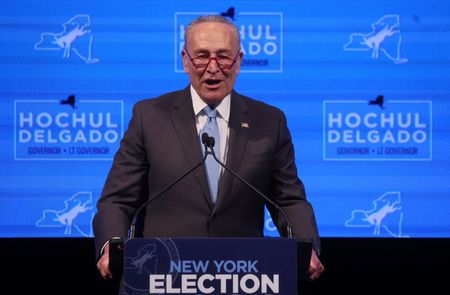By David Morgan and Moira Warburton
WASHINGTON (Reuters) – The U.S. Congress may be forced to delay until early 2023 final agreement on funding the government through the end of its fiscal year, instead relying on a stopgap measure to keep the lights on, the top Senate Republican said on Tuesday.
The federal government is currently set to run out of money on Dec. 16 without a vote on either an “omnibus” bill funding the government through Sept. 30, 2023, or a short-term bill known as a “continuing resolution,” or CR.
“We’re running out of time, and that may end up being the only option left that we could agree to pursue,” Senate Republican leader Mitch McConnell told reporters a day after meeting his Democratic counterpart Chuck Schumer to discuss a comprehensive omnibus package.
“We don’t have agreements to do virtually anything,” McConnell said. “We don’t even have an overall agreement on how much we want to spend.”
An omnibus bill would be expected to exceed the $1.5 trillion funding package Congress approved last March. Senator Richard Shelby, the top Republican appropriator, said the two sides were about $25 billion apart, which he described as “pretty close.”
McConnell spoke the day after House Republican leader Kevin McCarthy told Fox News negotiators should hold off until January, when the new Congress with a slim Republican majority in the House is sworn in.
A Republican congressional aide, who asked for anonymity to describe intra-party dynamics, said McCarthy’s warning was meant to pressure Democrats to move forward on an omnibus deal. The aide added that McCarthy has privately backed a longer-term bill to avoid a funding stand-off early in 2023.
Schumer acknowledged that there was still “a lot of negotiating left to do” to get an omnibus bill.
“Leader McConnell and I have agreed to try and work together to make sure we get a year-long omnibus funding bill done. We hope it can be done this year,” Schumer told reporters.
Schumer and McConnell had said an omnibus was vital for national security. A continuing resolution, or CR, would force the military to operate under funding levels of the last fiscal year.
McCarthy told Reuters he supported McConnell’s work.
“McConnell’s over there trying to do something in good faith. I understand that,” McCarthy said. “McConnell’s making the argument back very strong to them that they’ve already spent all this money.”
Republicans have pressed for an omnibus that would increase defense spending but hold non-defense funding steady, arguing Democrats expanded domestic spending in August with their $430 billion Inflation Reduction Act.
Federal agencies have been shuttered 10 times since 1981. The longest, under former President Donald Trump, lasted 35 days.
(This story has been refiled to fix typo in McConnell title in the third paragraph)
(Reporting by Moira Warburton, David Morgan, Eric Beech, Katherine Jackson and Gram Slattery; Editing by Scott Malone, Chizu Nomiyama, Alistair Bell and Lincoln Feast.)





